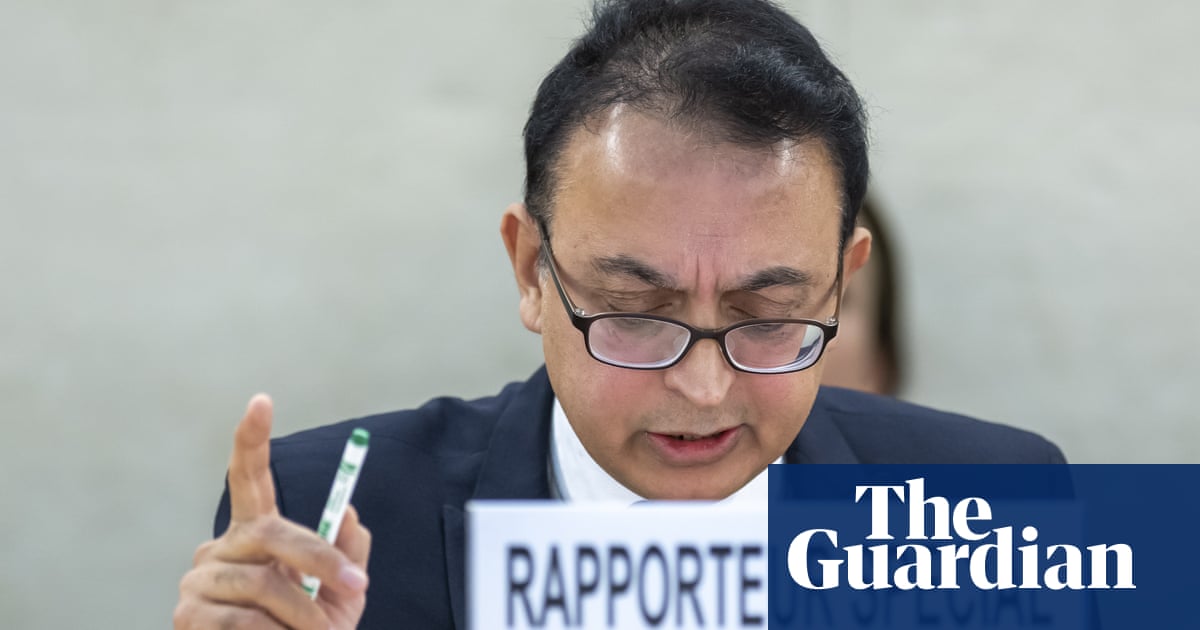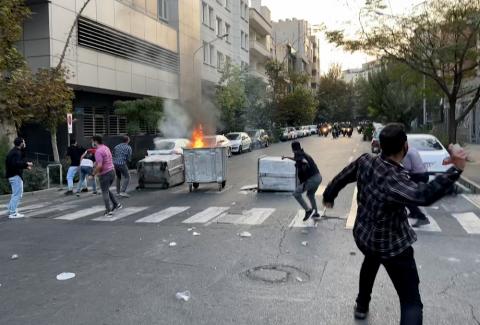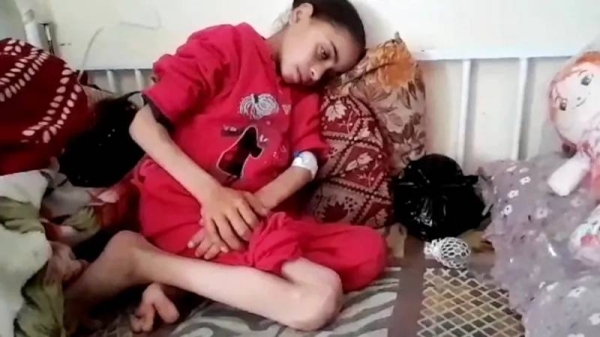
A UN human rights expert has said the scale and gravity of Iran’s violations of human rights amount to a crime against humanity.
The remarks on Monday by the UN rapporteur on Iran, Javaid Rehman, came as the EU and the UK imposed a fresh round of sanctions on Revolutionary Guards (IRGC) officers, judicial officials and clerics, but held back from proscribing the IRGC.
Rehman warned Iran was experiencing the most serious violations in four decades. He also claimed the death in police custody of Mahsa Amini, a young Kurdish woman, in September 2022 resulted from beatings by the “morality police”. Iran has said she died from a pre-existing neurological disorder, but Rahman said reliable medical sources pointed to state culpability.
He said Iran had refused to conduct an impartial or transparent inquiry into her death, including the allegations that she was beaten up and tortured.
“The scale and gravity of the violations committed by Iranian authorities, especially since the death of Ms Amini, points to the possible commission of international crimes, notably the crimes against humanity of murder, imprisonment, enforced disappearances, torture, rape and sexual violence, and persecution,” he said.
Drawing on evidence, including eyewitness testimony and comments from reliable medical sources, the report said it was clear she had died on 16 September “as a result of beatings by the state “morality police”.
“I would like to stress that her death was not an isolated event but the latest in a long series of extreme violence against women and girls committed by the Iranian authorities,” Rehman said.
He said “the responsibility of top senior officials in instigating this violence can … not be ignored.”
The UN human rights council decided last November – despite protests from Beijing and Tehran itself – to launch a fact-finding mission into the repression of peaceful demonstrators after protests erupted around Iran. A fact-finding team has been appointed but has been denied access to Iran.
“Protesters including children were beaten to death,” Rehman said, adding that “at least 527 people, including 71 children were killed, and hundreds of protesters severely injured.”
He also said dozens of protesters “have lost their eyes because of direct shots to the head”, while Iranian doctors had reported that women and girls participating in the demonstrations “were targeted with shotgun fire to their faces, breasts and genitals”.
He said: “Children released have described sexual abuses, threats of rape, floggings, administration of electric shocks and how their heads were maintained underwater, how they were suspended from their arms or from scarves wrapped around their necks.”
Since the start of the protests, the highest levels of the state have instigated violence and instructed the security forces to “confront the enemies”. In line with these martial instructions, Iranian security forces, in what appears to be a policy followed in all regions of the country and particularly in Kurdish and Baluchi regions, have killed hundreds of protesters including children. These killings amount to arbitrary deprivation of life in violation of article 6 of the International Covenant on Civil and Political Rights, to which the Islamic Republic of Iran is a state party.
The EU says it has now imposed sanctions on 204 individuals and 34 entities in six waves of sanctions.
The UK announced it was putting sanctions on five members of the board of directors of the IRGC Co-operative Foundation. This organisation funnels money into the Iranian regime’s repression, the UK Foreign Office said.
Iran said on Sunday that despite sanctions it had shipped 83m barrels more of oil in the first 11 months of the Iranian calendar year than the corresponding period last year.
A UN human rights expert said Iranian authorities had committed widespread and serious violations since the death of Mahsa Amini, noting the breaches could amount to crimes against humanity.
Javaid Rehman, a special rapporteur on Iran, told the United Nations Human Rights Council on Monday the country was experiencing the most serious violations in four decades.
“The scale and gravity of the violations committed by Iranian authorities, especially since the death of Ms Amini, points to the possible commission of international crimes, notably the crimes against humanity of murder, imprisonment, enforced disappearances, torture, rape and sexual violence, and persecution,” he said.
Presenting his latest report to the council, Rehman said he had examined the circumstances around Amini’s death in custody following her arrest six months ago for flouting Iran’s strict dress code for women, and the subsequent protests.
Drawing on evidence, including eyewitness testimony and comments from reliable medical sources, the report said it was clear she had died lon 16 September “as a result of beatings by the state “morality police”.
“I would like to stress that her death was not an isolated event but the latest in a long series of extreme violence against women and girls committed by the Iranian authorities,” Rehman said.
He said “the responsibility of top senior officials in instigating this violence can … not be ignored.”
The UN rights council decided last November – over protests from Beijing and Tehran – to launch a fact-finding mission into the repression of peaceful demonstrators after protests erupted around Iran.
“Protesters including children were beaten to death,” Rehman said, adding that “at least 527 people, including 71 children, were killed, and hundreds of protesters severely injured.”
He also said dozens of protesters “have lost their eyes because of direct shots to the head”, while Iranian doctors had reported that women and girls participating in the demonstrations “were targeted with shotgun fire to their faces, breasts and genitals”.
Rehman highlighted mass arrests, including of human rights defenders, journalists, lawyers and students, as well as reports of torture and ill-treatment of those involved in the protests.
“Children released have described sexual abuses, threats of rape, floggings, administration of electric shocks and how their heads were maintained underwater, how they were suspended from their arms or from scarves wrapped around their necks,” he said.
He voiced outrage at the executions of at least four people associated with the protests “after arbitrary, summary, and sham trials marred by torture allegations”.
He added: “These summary executions are the symbols of a state ready to use all means to instil fear and quash protests,” pointing out that at least 17 other protesters have so far been sentenced to death and more than 100 others face charges that carry the death penalty.












